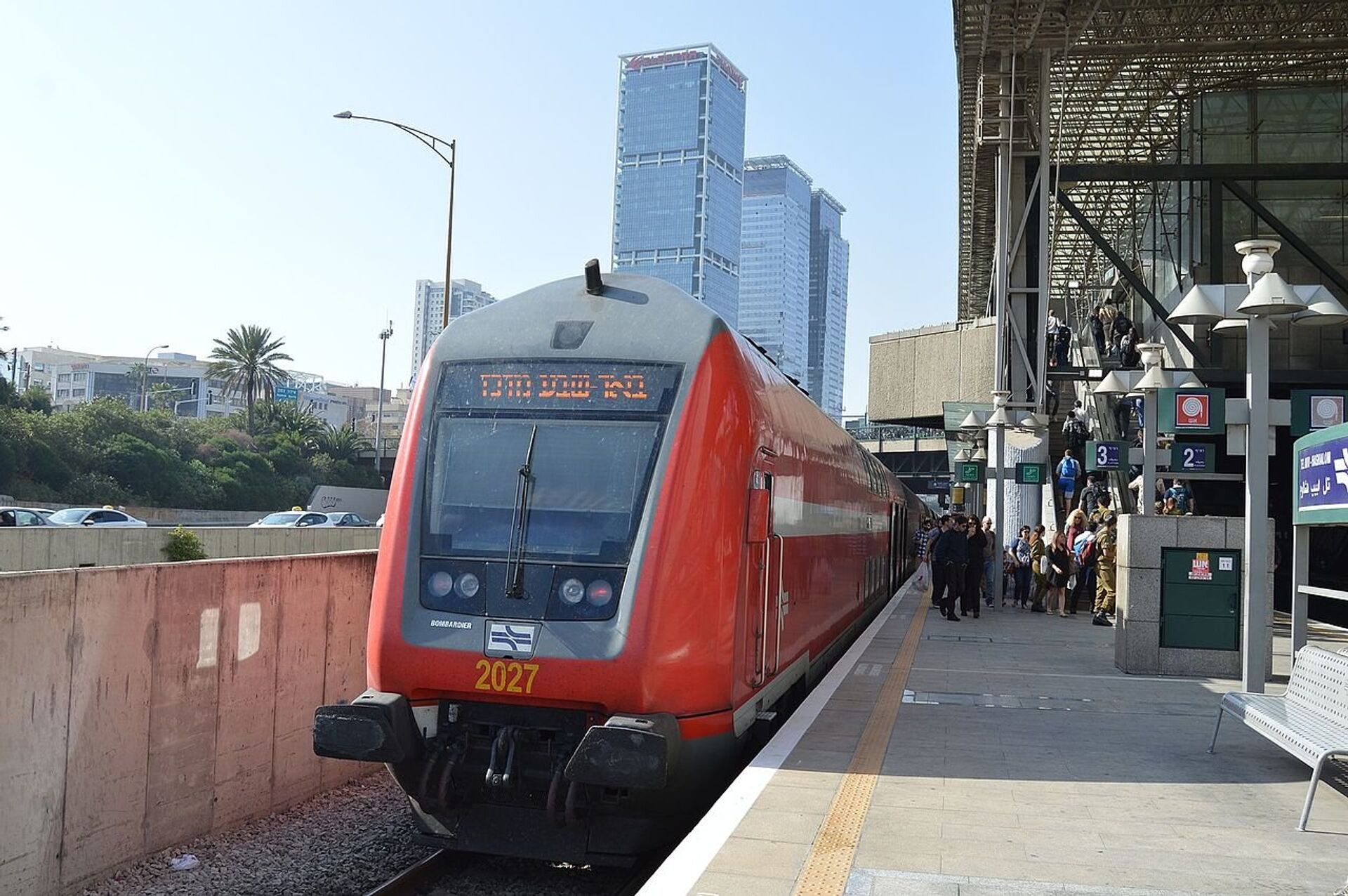https://sputnikglobe.com/20211103/israels-infrastructure-headache-only-going-to-get-worse-with-time-expert-says-1090435095.html
Israel's Infrastructure Headache Only Going to Get Worse With Time, Expert Says
Israel's Infrastructure Headache Only Going to Get Worse With Time, Expert Says
Sputnik International
Over the years, Israeli authorities have invested billions in broadening highways, digging tunnels, and constructing a sophisticated railway system but the... 03.11.2021, Sputnik International
2021-11-03T06:31+0000
2021-11-03T06:31+0000
2021-11-03T15:16+0000
infrastructure
middle east
israel
population growth
https://cdn1.img.sputnikglobe.com/img/07e5/05/0e/1082891329_0:160:3073:1888_1920x0_80_0_0_aaa8343602b560583fec6309c47464ce.jpg
With nearly 70 percent of its population fully vaccinated, many Israelis feel that their country has managed to curb the coronavirus pandemic.The nation's streets are buzzing, the roads are packed, and traffic jams are once again a headache. And that makes Israelis angry and frustrated.On average, Israelis spend half an hour in traffic per day, which translates into 5.5 days a year in which they simply don't move.No AlternativesProfessor Erel Avineri, the head of the MSc Program in Energy and Power Systems Engineering at AFEKA Tel Aviv Academic College, says Israelis rely on their cars in the absence of any other alternatives.In Israel, however, the choice is minimal as infrastructure is lacking. A subway system is non-existent, the periphery is poorly connected to the centre with a network of trains and the number of buses is believed to be substandard.Growing Population as Core ProblemBut Avineri is certain that the situation is only going to get worse with time, and the reason for this is Israel's rapid population growth.The way it stands now, Israel is leading in fertility rates among all OECD countries, with women producing three children on average. The country's population already stands at nine million people and the projections are that by 2050 it will reach almost 16 million people.The catch is that Israel's infrastructure is just not keeping up with that rapid growth. "It takes years and even decades to plan, approve, develop, and construct infrastructure projects. And by the time some of them are completed, they are no longer relevant, as they meet the demands of the past, not of the future", explained the expert.Israeli lawmakers are well aware of the current infrastructure crisis. Over the years, the nation has invested billions into broadening roads, digging tunnels, opening new highways, boosting the train system with more carriages, purchasing more buses, and constructing light rail in several cities across the country.Yet, Avineri says the efforts that were exerted and the funds given were insufficient.Avineri is an engineer, not a politician. He struggles to understand the political reasons behind the decisions to neglect the country's infrastructure. But he is warning that if Israel doesn't wake up, the situation might soon be irreversible.Wake Up CallWaking up not only means that Israel needs to inject more cash into its infrastructure projects. It needs to make a shift in its current policies and that might mean the country will need to take painful decisions when it comes to its rapid population rates.That, however, will be tricky, primarily among religious circles that normally produce seven children on average. But Avineri says the clock is ticking, and if Israel wants to survive, it won't have any choice but to make a change.
israel
Sputnik International
feedback@sputniknews.com
+74956456601
MIA „Rossiya Segodnya“
2021
News
en_EN
Sputnik International
feedback@sputniknews.com
+74956456601
MIA „Rossiya Segodnya“
Sputnik International
feedback@sputniknews.com
+74956456601
MIA „Rossiya Segodnya“
infrastructure, middle east, israel, population growth
infrastructure, middle east, israel, population growth
Israel's Infrastructure Headache Only Going to Get Worse With Time, Expert Says
06:31 GMT 03.11.2021 (Updated: 15:16 GMT 03.11.2021) Over the years, Israeli authorities have invested billions in broadening highways, digging tunnels, and constructing a sophisticated railway system but the efforts exerted were too insufficient, and the money poured in too little.
With nearly 70 percent of its population fully vaccinated, many Israelis feel that their country has managed to curb the coronavirus pandemic.
The nation's streets are buzzing, the roads are packed, and traffic jams are once again a headache.
And that makes Israelis angry and frustrated.On average, Israelis spend half an hour in traffic per day, which translates into 5.5 days a year in which they simply don't move.
Professor Erel Avineri, the head of the MSc Program in Energy and Power Systems Engineering at AFEKA Tel Aviv Academic College, says Israelis rely on their cars in the absence of any other alternatives.
"It is not always convenient to have a car in Israel. It is good to have alternatives like they do in Europe. They have trains and bicycle lanes, so they can choose".
In Israel, however, the choice is minimal as infrastructure is lacking. A subway system is non-existent, the periphery is poorly connected to the centre with a network of trains and the number of buses is believed to be substandard.
Growing Population as Core Problem
But Avineri is certain that the situation is only going to get worse with time, and the reason for this is
Israel's rapid population growth.The way it stands now, Israel is leading in fertility rates among all OECD countries, with women producing three children on average. The country's population already stands at nine million people and the projections are that by 2050 it
will reach almost 16 million people.The catch is that Israel's infrastructure is just not keeping up with that rapid growth. "It takes years and even decades to plan, approve, develop, and construct infrastructure projects. And by the time some of them are completed, they are no longer relevant, as they meet the demands of the past, not of the future", explained the expert.
Israeli lawmakers are well aware of the current infrastructure crisis. Over the years, the nation has invested billions into broadening roads, digging tunnels, opening new highways, boosting the train system with more carriages, purchasing more buses, and constructing light rail in several cities across the country.
Yet, Avineri says the efforts that were exerted and the funds given were insufficient.
"In the first years of Israel's existence, it was difficult to develop infrastructure, [partially due to security and partially due to budget restraints]".
"Now, the lack of funds cannot be used as an excuse, especially in the past two decades when the financial situation of Israel has been relatively stable".
Avineri is an engineer, not a politician. He struggles to understand the political reasons behind the decisions to neglect the country's infrastructure. But he is warning that if Israel doesn't wake up, the situation might soon be irreversible.
Waking up not only means that Israel needs to inject more cash into its infrastructure projects. It needs to make a shift in its current policies and that might mean the country will need to take painful decisions when it comes to its rapid population rates.
"If 40 years from now, Israel's population doubles, it will have an impact on all walks of life. It will mean that we will need to double the infrastructure we have, double the schools and hospital beds. And if we cannot prepare ourselves for that, we need to make reforms that would limit the population growth".
That, however, will be tricky, primarily among religious circles that normally produce seven children on average. But Avineri says the clock is ticking, and if Israel wants to survive, it won't have any choice but to make a change.



